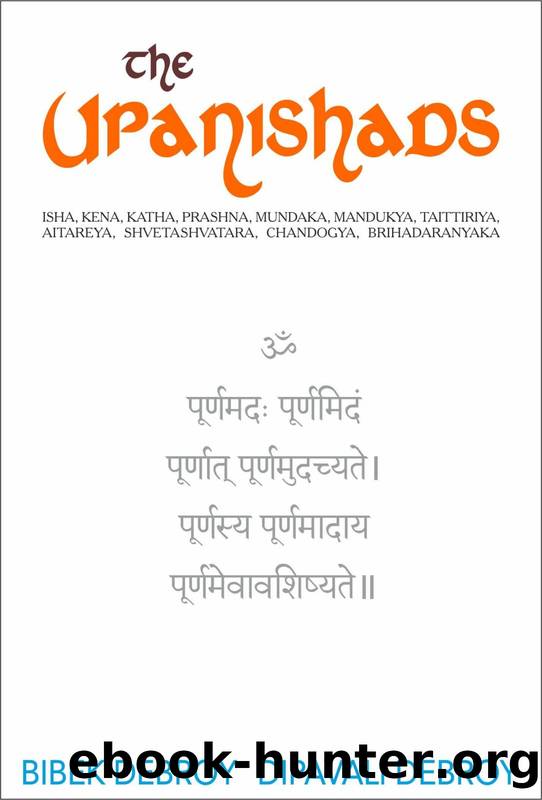The Upanishads: Isha, Kena, Katha, Prashna, Mundaka, Mandukya, Taittiriya, Aitareya, Shvetashvatara, Chandogya, Brihadaranyaka by Bibek Debroy & Dipavali Debroy

Author:Bibek Debroy & Dipavali Debroy
Language: eng
Format: mobi, epub, azw3
Publisher: Books For All (An Imprint of LPP)
Published: 2020-08-19T22:00:00+00:00
THE BRIHADARANYAKA UPANISHAD
(Jnana kanda includes various philosophical texts known as the Aranyakas and the Upanishads. The distinction is not always watertight. For example, the Shatapatha Brahman includes, towards its end, an Aranyaka. It is this Aranyaka that goes by the name of the Brihadaranyaka Upanishad. The word brihat means great. And the Brihadaranyaka Upanishad is so named because it is the longest of the Upanishads.
The Brihadaranyaka Upanishad is divided into three sections (kanda). These are known as madhu kanda, yajnavalkya kanda or muni kanda and khila kanda. Each kanda is subdivided into chapters (adhyaya) and each adhyaya is subdivided into brahmanas. (These brahmanas are not to be confused with the Brahmanas that have been mentioned earlier.)
The broad scheme of the Brihadaranyaka Upanishad is as follows. Madhu kanda has two chapters, each of these chapters has six brahmanas. The first chapter has 80 verses and the second chapter has 66 verses. Yajnavalkya kanda consists of chapters three and four. Chapter three has nine brahmanas and chapter four has six. There are 92 verses in both chapters three and four. Khila kanda consists of chapters five and six. Chapter five has fifteen brahmanas and chapter six has five. There are 30 verses in chapter five and 75 in chapter six.
Thus, the Brihadaranyaka Upanishad has 435 verses in all. Madhu kanda has 146 verses.
Yajnavalkya kanda has 184 verses. Khila kanda has 105 verses.
Let us now get straight into what the Brihadaranyaka Upanishad has to say. It starts with a shanti patha (invocation for peace).
Since this is often recited, we reproduce the original Sanskrit as well.)
Oum purnamadah purnamidam purnat purnamudachyate
Download
The Upanishads: Isha, Kena, Katha, Prashna, Mundaka, Mandukya, Taittiriya, Aitareya, Shvetashvatara, Chandogya, Brihadaranyaka by Bibek Debroy & Dipavali Debroy.epub
The Upanishads: Isha, Kena, Katha, Prashna, Mundaka, Mandukya, Taittiriya, Aitareya, Shvetashvatara, Chandogya, Brihadaranyaka by Bibek Debroy & Dipavali Debroy.azw3
This site does not store any files on its server. We only index and link to content provided by other sites. Please contact the content providers to delete copyright contents if any and email us, we'll remove relevant links or contents immediately.
Fingersmith by Sarah Waters(2004)
Kundalini by Gopi Krishna(1821)
The Bhagavad Gita by Bibek Debroy(1665)
Indian Mythology by Devdutt Pattanaik(1618)
Wheels of Life by Anodea Judith(1602)
The Yoga of Jesus: Understanding the Hidden Teachings of the Gospels by Paramahansa Yogananda(1522)
The Man from the Egg by Sudha Murty(1498)
Autobiography of a Yogi (Complete Edition) by Yogananda Paramahansa(1485)
Chakra Mantra Magick by Kadmon Baal(1382)
The Book of Secrets: 112 Meditations to Discover the Mystery Within by Osho(1349)
Avatar of Night by Tal Brooke(1256)
The Sparsholt Affair by Alan Hollinghurst(1242)
Sparks of Divinity by B. K. S. Iyengar(1226)
Karma-Yoga and Bhakti-Yoga by Swami Vivekananda(1217)
The Bhagavad Gita (Classics of Indian Spirituality) by Eknath Easwaran(1205)
Gandhi by Ramachandra Guha(1191)
The Spiritual Teaching of Ramana Maharshi by Ramana Maharshi(1170)
Skanda Purana (Great Epics of India: Puranas Book 13) by Bibek Debroy & Dipavali Debroy(1137)
Hinduism: A Very Short Introduction (Very Short Introductions) by Knott Kim(1115)
